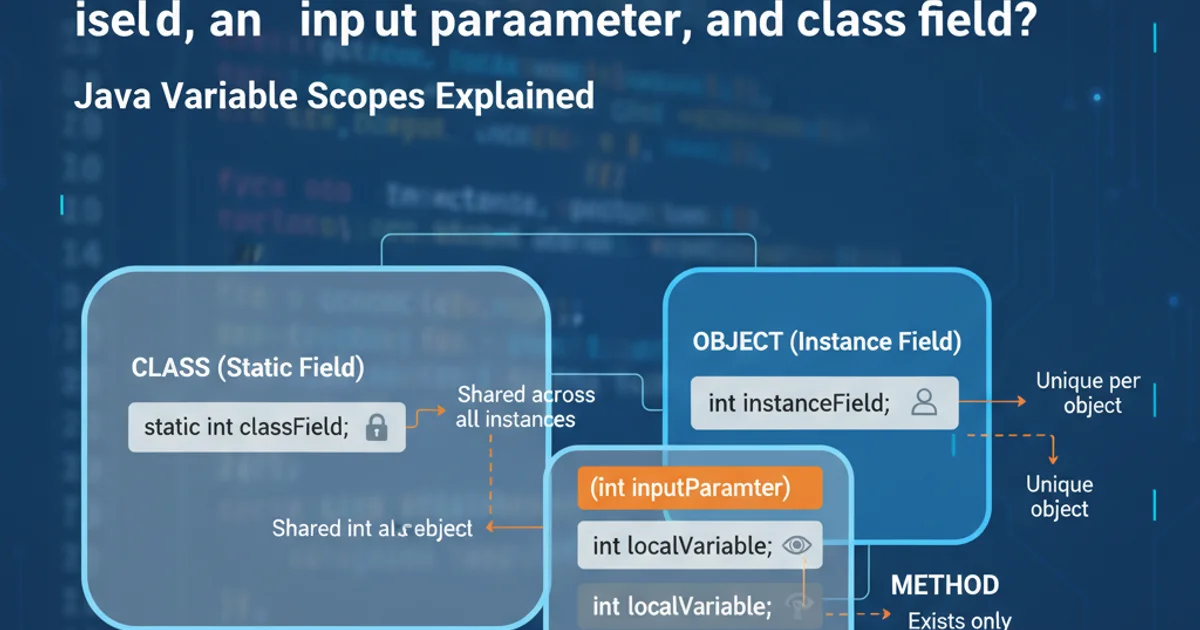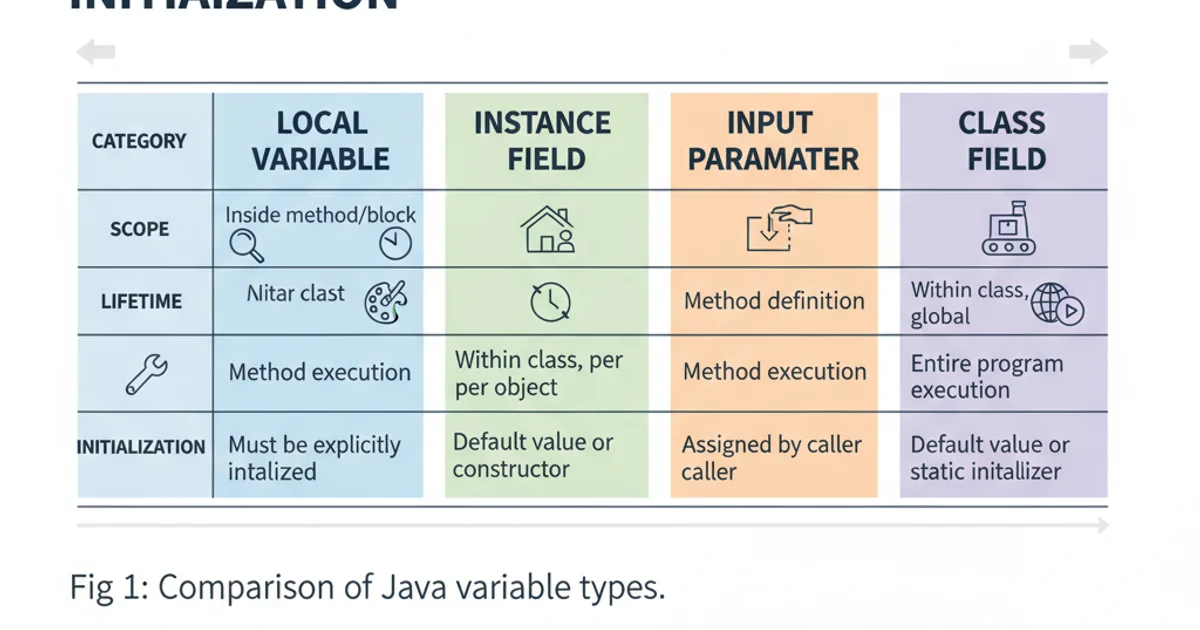What is the difference between a local variable, an instance field, an input parameter, and a cla...
Categories:
Understanding Variable Scopes: Local, Instance, Input, and Class Fields in Java

Explore the fundamental differences between local variables, instance fields, input parameters, and class fields in Java, including their scope, lifetime, and usage.
In Java programming, understanding the different types of variables and their scopes is crucial for writing clean, efficient, and bug-free code. Variables are used to store data, but where they can be accessed and how long they persist depends on their declaration and location within the code. This article will demystify the distinctions between local variables, instance fields, input parameters, and class fields, providing clear examples and explanations.
Local Variables: The Short-Lived Workhorses
Local variables are declared inside a method, constructor, or block. Their scope is limited to the block in which they are declared, meaning they can only be accessed from within that block. They are created when the block is entered and destroyed when the block is exited. Local variables must be initialized before use; the Java compiler will report an error if you try to use an uninitialized local variable.
public class Calculator {
public int add(int a, int b) {
int sum = a + b; // 'sum' is a local variable
return sum;
} // 'sum' ceases to exist here
public void exampleMethod() {
String message = "Hello"; // 'message' is a local variable
if (true) {
int temp = 10; // 'temp' is a local variable to this if block
System.out.println(temp);
} // 'temp' ceases to exist here
// System.out.println(temp); // This would cause a compile-time error
System.out.println(message);
}
}
Example of local variables within methods and blocks.
Input Parameters: Method's Data Entry Points
Input parameters (also known as method parameters or arguments) are variables declared in the signature of a method or constructor. They act as local variables within the method's body, receiving values passed during a method call. Their scope is limited to the method or constructor they belong to, and they are initialized with the values provided by the caller. Like local variables, they cease to exist once the method execution completes.
public class Greeter {
public void greet(String name) { // 'name' is an input parameter
String greeting = "Hello, " + name + "!"; // 'greeting' is a local variable
System.out.println(greeting);
}
public static void main(String[] args) {
Greeter myGreeter = new Greeter();
myGreeter.greet("Alice"); // "Alice" is passed as the value for 'name'
}
}
Illustrating an input parameter in a method signature.
Instance Fields: Object's State Keepers
Instance fields (also known as non-static fields or member variables) are declared directly within a class, but outside any method, constructor, or block. Each object (instance) of the class gets its own copy of these fields. They represent the state of an object and persist as long as the object itself exists in memory. Instance fields are automatically initialized to default values (e.g., 0 for numeric types, false for booleans, null for objects) if not explicitly initialized.
public class Car {
String make; // Instance field
String model; // Instance field
int year; // Instance field
public Car(String make, String model, int year) {
this.make = make;
this.model = model;
this.year = year;
}
public void displayCarInfo() {
System.out.println("Make: " + make + ", Model: " + model + ", Year: " + year);
}
public static void main(String[] args) {
Car myCar = new Car("Toyota", "Camry", 2020);
Car anotherCar = new Car("Honda", "Civic", 2022);
myCar.displayCarInfo(); // Uses myCar's make, model, year
anotherCar.displayCarInfo(); // Uses anotherCar's make, model, year
}
}
Instance fields defining the state of a 'Car' object.
Class Fields: Shared Across All Instances
Class fields (also known as static fields or static member variables) are declared using the static keyword within a class, outside any method, constructor, or block. Unlike instance fields, there is only one copy of a class field, shared by all instances of the class. They belong to the class itself, not to any specific object. Class fields are initialized when the class is loaded and persist for the entire duration the program is running. They are often used for constants or data that needs to be shared among all objects of a class.
public class Configuration {
public static final String APP_NAME = "MyAwesomeApp"; // Class field (constant)
public static int userCount = 0; // Class field
public Configuration() {
userCount++; // Increments the shared userCount for every new instance
}
public static void main(String[] args) {
System.out.println("Application Name: " + Configuration.APP_NAME);
Configuration config1 = new Configuration();
Configuration config2 = new Configuration();
System.out.println("Total Users: " + Configuration.userCount); // Access via class name
}
}
Class fields for shared application data and constants.
classDiagram
class MyClass {
- localVariable: int
+ inputParameter: String
- instanceField: double
+ static classField: boolean
+ myMethod(inputParameter: String): void
+ MyClass(instanceField: double)
}
MyClass --> localVariable : declared in method
MyClass --> inputParameter : declared in method signature
MyClass o-- instanceField : one per object
MyClass ..> classField : one per class (shared)UML Class Diagram illustrating variable types and their association with a class.
Summary of Differences
Here's a quick recap of the key distinctions:

Comparison of Java Variable Types
By understanding these fundamental differences, you can write more robust, maintainable, and efficient Java applications. Always consider the scope and lifetime requirements of your data when declaring variables.